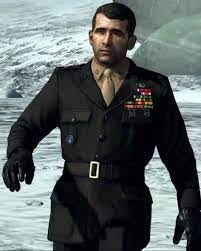Call of Duty — The War Crimes Simulator
How Call of Duty propagandizes its audience and hurts US Foreign Policy.
Please click the heart at the top of this page. It “pays” me without costing you anything (kinda like a credit card).
Subscribe 3 friends for JoeWrote and I’ll send you a War on Christmas Veteran sticker. Message me on Twitter to claim your reward.
Today we’re looking at Call of Duty and how it perpetuates myths of American Foreign Policy.
With the release of Call of Duty: Black Ops Cold War, the king of first-person shooters continues its frightening trend of misrepresenting the realities of U.S. militarism. In its early days, Call of Duty (or CoD as the cool kids say) was set in World War II, where players battled Nazi stormtroopers and Japanese imperialists. These settings and storylines were familiar and gave players a clear objective: be the hero.
But as jingoistic images of the wars in Iraq and Afghanistan flooded the media in the early 2000s, players tired of the same Pacific beaches and French countrysides. They wanted something new and exciting. To supply this demand, CoD left Normandy and Iwo Jima for more modern battlefields where players could wield state-of-the-art weaponry against digital versions of the same enemies they saw on credible news programs, such as CNN and 24.

But the setting was not the only change. Since moving to the contemporary settings of the Cold War and the Forever War, CoD has purposefully obscured the impacts of U.S. military intervention. From parroting the lies of the Iraq War to justifying inexcusable Cold War crimes, CoD goes out of its way to perpetuate the myth of the United States as a “good empire” to its impressionable audience. And while game makers might not want to believe it, their myths have real consequences.
It’s not hard to see why the historical alterations began once the series left WWII for modern warscapes. For WWII-centered games, the moral justification for killing Nazis with flamethrowers doesn’t need to be explained. (Fascists are bad. Genocide is bad. Killing genocidal fascists is good.) But in the Forever Wars, the “good guy” narrative isn’t so clear.
When CoD entered Iraqi cities and Vietnamese rice paddies, the character’s presence and belligerency was no longer justifiable at face value. In the real-life locations these levels are based on, the morality of western military action varies greatly, from the just assassination of Osama Bin Laden to the atrocity of the My Lai massacre.
But in attempting to maintain the constant aura of the main character being The Good Guy, the games’ designers often take drastic creative liberties that wind up leaving the audience with a heavily skewed version of history.
Modern Tour-Ware
In the first game set outside of WWII, 2007’s Call of Duty 4: Modern Warfare, the player is dropped into the U.S. invasion of Iraq an unnamed Middle Eastern country ruled by a murderous tyrant. But in this retelling of the Iraq War, the Saddam Hussein stand-in actually has nukes.
When the mushroom cloud appears, the player is left feeling righteous, justified, and glad U.S. soldiers are currently in the real Iraq to stop such an atrocity from happening for real. The only problem is that the real Saddam Hussein never had WMDs, a fact conveniently omitted from the CoD storyline.
Years later, Call of Duty: Black Ops, the predecessor to the most recent game, credits the CIA’s MK ULTRA mind control program—which was both a tactical failure and gross violation of civil rights—with preventing a Soviet chemical attack. The sequel, Black Ops II, used Lieutenant Colonel Oliver North, who illegally armed and financed the Contra death squads in Nicaragua, as a consultant. They even went so far as to make him a character in the game.
2019’s Modern Warfare remake highlights the central contradiction of the “good empire” mythos. One mission has the player use air support to defend a Benghazi-style compound from “Al-Qatala.” (Real creative writer’s room.) The game even manifests an alternative to the right-wing conspiracy of “denied air support,” allowing the player to “stop Benghazi.”
And in perhaps the most spectacular, mouth-agape moment in the entire series, the very next mission takes place among the charred vehicles of the “Highway of Death.” In reality, the Highway of Death was named when an American-led coalition used airstrikes to obliterate a caravan of defeated Iraqi soldiers and Kuwaiti civilians during the Gulf War, killing hundreds. But in a breathtakingly wild fabrication, CoD flat-out lies and blames this atrocity on Russia.
In both these missions, CoD recreates notable events, but discreetly whitewashes the complexities and drawbacks of military intervention. In “Benghazi,” the game advocates for more military force, while on “The Highway of Death,” the dark side of such force is ignored.
But perhaps the most harmful (and confusing) theme of the franchise is its villains. Throughout the games, the endless waves of bad guys you mow down with missiles and machine guns come from a farfetched alliance of Arabs, Soviets, Vietnamese, South Americans, and Chinese fighters who “want to see the West fall.” In CoD 4, the player finds an Arabic nuke on a Russian freighter, while Cold War posits that Pablo Escobar is in cahoots with the Soviets. (???) It’s George W. Bush’s “Axis of Evil” taken to an even more cartoonish degree.
Whether preached by a real Bush or a computer-generated Ronald Reagan, the belief that all opposition to the United States is because “they hate our freedoms” is detrimental. It’s a dangerous oversimplification that has led this nation into a series of unending wars, costing us, and the rest of the world, much death and tragedy.
Fake Games. Real Consequences.
The falsehoods conveyed in Call of Duty aren’t trivial. Entertainment shapes its audience’s worldview. It’s why the Pentagon has consulted on more than a thousand movies and dozens of video games, including CoD.
From implying that Saddam had nukes (he didn’t), to portraying torture as an effective means of intelligence gathering (it isn’t), CoD is in lockstep with “The Blob” (a nickname for America’s interventionist-prone foreign policy establishment, coined by Obama aid Ben Rhodes) in justifying every CIA incursion and military intervention while downplaying the blowback.
As Americans tire of the Forever Wars, “The Blob” exaggerates the effectiveness and cleanliness of militarism while understating the repercussions. This messaging takes many forms, from op-eds, to books, to blockbusters, to CoD.

With a little help from the Pentagon, CoD builds a world where American military might is the only thing keeping society intact. Black Ops Cold War opens with a computer-generated Ronald Reagan saying the player’s mission is both “of the highest honor” and “highly illegal.”
The player then spends the next ten hours making paper airplanes out of the Geneva Accords and the U.S. Constitution by invading sovereign countries and executing prisoners. Even when it doesn’t shy from actual atrocities, the story-telling excuses them, arguing that unapologetic militarism is the only effective foreign policy, and war crimes are just the cost of business.
“You can’t make an omelet without assassinating a few civil rights leaders” - Ronald Regan (probably).
Whether it’s echoed by a prestigious newspaper or CoD, the mantra that U.S. military intervention is uniformly clean and virtuous is highly deceitful. A nuanced conversation about the United States’ role and responsibility in the world is necessary, but it must portray the entirety of our military actions, not just the “righteous” ones.
And that brings us to the true harm of Call of Duty — its portrayal of military intervention as the only serious form of foreign policy. As recent history has shown, U.S. diplomacy is far more effective and ethical than U.S. militarism. Unlike the Iraq and Afghanistan Wars, the Iran Nuclear Deal and Paris Climate Accords were successful. It wasn’t generals and bombs that achieved these pacts, but diplomats and pen strokes.
Willingly or not, Call of Duty is propaganda for a “shoot first, ask questions never” mindset. This is a dangerous belief for the United States, as it ties our hands to a gun and gives us just two foreign policy options: shoot or don’t.
If you liked what you read today, share, like, and subscribe. If you sign up 3 frees, I’ll send you one of my War on Christmas Veteran stickers. HMU on Twitter to claim your reward.
This article originally appeared on The Progressive.







Great job. Such a good comparison of truth, falsehood, and the consequences of inaccurate portrayal in entertainment.